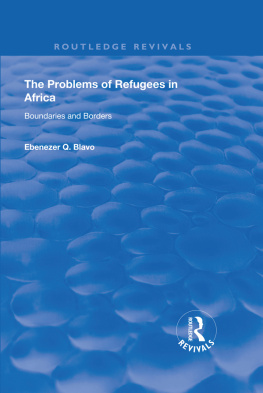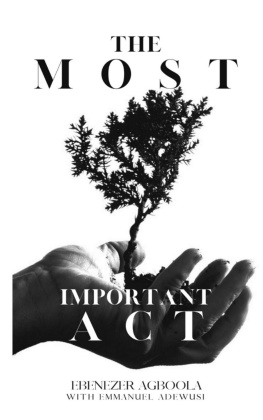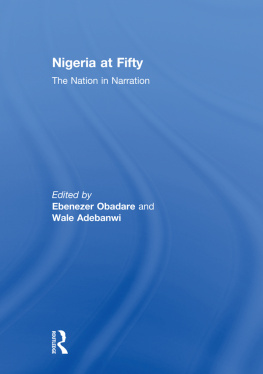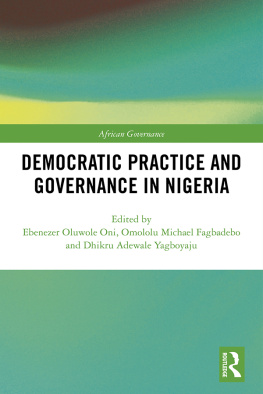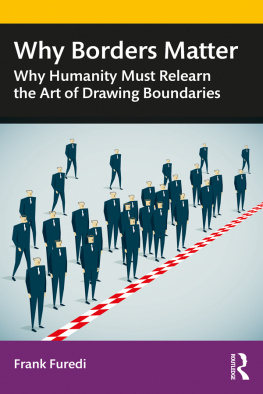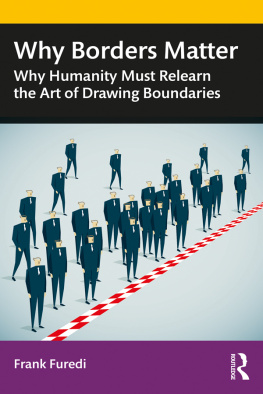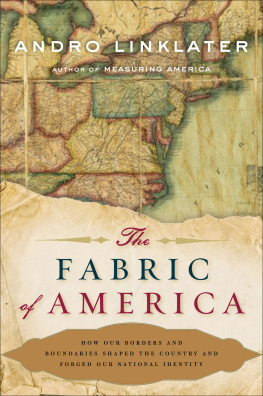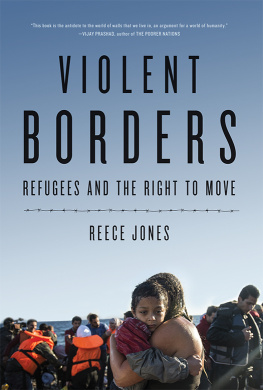THE PROBLEMS OF REFUGEES IN AFRICA
Dedicated to my wife, Cynthia and my children, Cyril, Dorothy and Margaret.
Thank you for being so loyal and supportive.
We must transform the presence of refugees in the various African countries, which is often felt to be a liability, into assets of the economic and social balance of the countries development...
Prince Sadruddin Aga Khan former UN High Commissioner for Refugees, Conference on the Legal, Economic and Social Aspects of African Refugee Problems, 9-18 October, 1967, Final Report. Sponsors: United Nations Economic Commission for Africa; United Nations High Commissioner for Refugees; Organisation of African Unity; Dag Hammarskjold Foundation. Addis Ababa, December, 1968
The Problems of Refugees in Africa
Boundaries and borders
EBENEZER Q. BLAVO
Centre for Social Policy Studies
University of Ghana
Legon
First published 1999 by Ashgate Publishing
Reissued 2018 by Routledge
2 Park Square, Milton Park, Abingdon, Oxon, OX14 4RN
711 Third Avenue, New York, NY 10017, USA
Routledge is an imprint of the Taylor & Francis Group, an informa business
Copyright Ebenezer Q. Blavo 1999
All rights reserved. No part of this book may be reprinted or reproduced or utilised in any form or by any electronic, mechanical, or other means, now known or hereafter invented, including photocopying and recording, or in any information storage or retrieval system, without permission in writing from the publishers.
Notice:
Product or corporate names may be trademarks or registered trademarks, and are used only for identification and explanation without intent to infringe.
Publishers Note
The publisher has gone to great lengths to ensure the quality of this reprint but points out that some imperfections in the original copies may be apparent.
Disclaimer
The publisher has made every effort to trace copyright holders and welcomes correspondence from those they have been unable to contact.
A Library of Congress record exists under LC control number: 99072846
ISBN 13: 978-1-138-34159-3 (hbk)
ISBN 13: 978-0-429-44006-9 (ebk)
The refugee situation in Africa is the direct outcome of the numerous conflicts plaguing almost all the countries in Africa since they attained independence. It has created tremendous physical, social and psychological problems for the uprooted, has wasted vast material resources and impeded progress in the developmental efforts of governments, Many are unaware of the death-toll, the bitter experiences associated with homelessness and what it means to be in refuge. This book is an attempt to make the facts known to all and to stress the need for a concerted effort by all to achieve lasting peace on the continent.
My service to the United Nations High Commissioner for Refugees 1973-1985 gave me ample opportunity to be in the field and in close contact with refugees of almost all nationalities in Africa, and with operational partners, government agencies and non-governmental organizations, including the religious bodies. I came into grips with the real situation and appreciated the confidences entrusted to me by refugees. This heightened my resolve and the commitment to their cause. Together with government counterparts in many African countries, we promoted our joint endeavours to find solutions to the complex problems on our hands. All this knowledge and experience has been brought to bear on the writing of this book. I am greatly indebted to all of them.
This work was originally in partial fulfilment of the requirements for the award of the Doctor of Philosophy Degree in Sociology, University of Ghana. I was encouraged by friends and former colleagues to publish my work at this time of extensive turmoil in Africa and to highlight current world concerns for refugees.
I would like to acknowledge the assistance of one such friend, Margaret Grieco, DPhil (Oxon), Professor of Organisation and Development Management of the Business School of the University of North London, by whose guidance and support this book was published. I am truly grateful to her.
I am indebted to my wife Cynthia for showing considerable interest in my work.
I express my appreciation for the untiring effort of Mrs Dorothy Stella Quarshie in typing the manuscript. Finally, I would like to thank Ashgate Publishing Limited for publishing this book. Needless to say I take full responsibility for everything written in this book.
Ebenezer Q. Blavo
Affiliate
Centre for Social Policy Studies
University of Ghana
Legon
AACC | All African Council of Churches |
ECA | United Nations Economic Commission for Africa |
ICRC | International Committee for the Red Cross |
ILO | International Labour Organization |
LWF | Lutheran World Federation |
OAU | Organization of African Unity |
UN | United Nations Organization |
UNDP | United Nations Development Programme |
UNHCR | United Nations Economic Commissioner for Refugees |
UNICEF | United Nations Childrens Fund |
WCC | World Council of Churches |
WFP | World Food Programme WHO World Health Organization |
The Problem
Africa is going through a crucial period of adversity this century. In the past five decades, various forms of man-made disasters have forced millions of people out of their homeland into refuge in other countries. The uprooted are essentially women and children exposed to life-threatening situations, the consequences of which they are destined to endure. While in refuge, theirs is a desperate struggle for protection and sustenance.
Uprootment is not new to mankind. From time immemorial individuals and laige groups of people had to take refuge long distances away from home in the face of persecution - wars and terror tactics of rulers. The modem phenomenon of uprootment in Africa is the direct outcome of the struggle for independence from colonial rule. The post-independence era is marred by conflicts emanating, in the main, from ethnic upheavals suppressed during colonial rule; border disputes over artificial boundaries created during the partitioning of the continent; confrontations between opposing political parties, and human rights abuses. Almost all of Africa is involved; each country either producing or receiving refugees or both, however insignificant.
The economic consequences of these conflicts directly impede both the social adjustment of refugees in their countries of refuge, and the development of the countries involved. A great deal of material resources are put to waste in conflict while nationals and refugees alike live in want.
The importance of the world refugee problem came to international awareness during World War II.
In peace time in 1951 the United Nations adopted the Convention Relating to the Status of Refugees to promote the interest of refugees in Europe. Contracting states to the International and Regional Refugee Conventions have adopted national refugee policies, based on the Conventions, for their guidance in the management of refugees in their territories.


